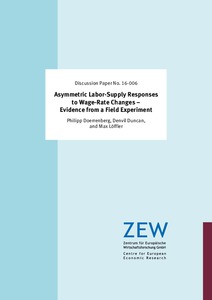Asymmetric labor-supply responses to wage-rate changes - evidence from a field experiment
"The standard labor-supply literature typically assumes that the labor supply response to wage increases is the same as that for equivalent wage decreases. However, evidence from the behavioral-economics literature suggests that people are loss averse and thus perceive losses differently than g...
| Main Authors: | , , |
|---|---|
| Institution: | ETUI-European Trade Union Institute |
| Format: | TEXT |
| Language: | English |
| Published: |
Mannheim
2016
ZEW |
| Subjects: | |
| Online Access: | https://www.labourline.org/KENTIKA-19107067124919252499-asymmetric-labor-supply-respon.htm |
| Summary: | "The standard labor-supply literature typically assumes that the labor supply response to wage increases is the same as that for equivalent wage decreases. However, evidence from the behavioral-economics literature suggests that people are loss averse and thus perceive losses differently than gains. This behavioral insight may imply that workers respond differently to wage increases than to wage decreases. We estimate the effect of wage increases and decreases on labor supply using a randomized field experiment with workers on Amazon's Mechanical Turk. The results provide evidence that wage increases have smaller effects than wage decreases, suggesting that the labor-supply response to wage changes is asymmetric. This finding is especially strong on the extensive margin where the elasticity for a wage decrease is twice that for a wage increase. These findings suggest that a reference-dependent utility function that incorporates loss aversion is the most appropriate way to model labor supply." |
|---|---|
| Physical Description: | 44 p. Digital |

